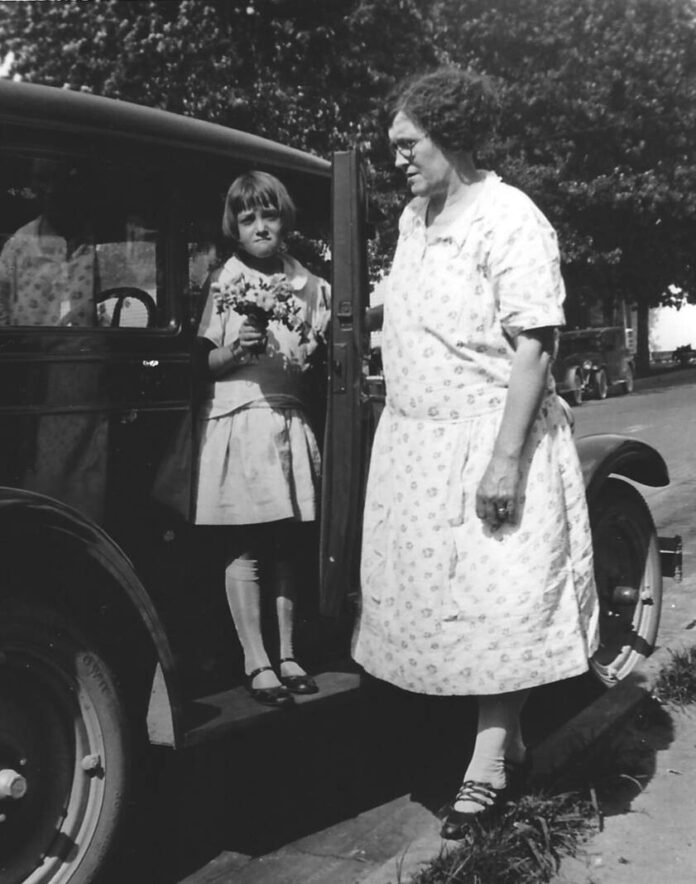
Sharon Magnas’ late mother Ruth Canary Drach with her grandmother, Jennie Canary, are shown around 1926.
Halloween is almost here, and Día de Los Muertos (Day of the Dead) follows close after on November 1st. Day of the Dead originated as a holiday in Mexico, but is now widely celebrated across Hispanic cultures. It’s also becoming more well-known north of the border, too.
I was surprised to learn the Day of the Dead is considered a joyous occasion and not a solemn one. It’s a colorful and happy time of remembrance; a time to celebrate family and friends who’ve gone before us. Many families build Day of the Dead altars, covering them with flowers, photos, candles and small tokens of affection to honor their departed loved ones. It’s a time for feasting, laughing and sharing family stories.
I’m 71, and if I don’t start sharing family-tales with my children and grandchildren soon, they’ll be lost to history.
So every now and then I think, “I need to get family stories written down for the grandkids.”
The oldest family story I know involves Canarys. And I’m not talking birds.
Descendants on my mother’s paternal side immigrated from England in the 1700s. They settled in Virginia and fought for the colonies during the Revolutionary War. As a precaution, they changed their name from Cantey to Canary. They knew if they were captured by the Redcoats and were discovered to have the English surname Cantey, they’d be accused of treason and risk going to the hanging tree.
The Canary’s later heeded the call of the western frontier, winding their way through Virginia and Kentucky, north across the Ohio River and finally settling in southwest Indiana. A few hardy Canary’s went further west, like my famous ancestor, “Calamity Jane” Canary.
My late mother, Ruth, and her grandmother were as different as night and day. But she would always share stories with my mom. Mom called Grandma Lydia Steele a “hard-shelled” Baptist. That meant lots of rules and not much fun. Grandma Steele even refused to cook on the Sabbath. Working on Sundays was sinful. At the Steele’s, life was full of don’ts: no smoking, no drinking, no card playing or dancing … and that was just the start of the list.
On the other hand, I was told my great-grandmother, Jennie Canary, was sweet and fun loving. She worked long hours running a restaurant, but still enjoyed cooking for her family after church on Sundays. Grandma Canary’s children and grandchildren always had a standing invitation to have Sunday dinner at the restaurant/gas station she and “Mr. Shively” managed in Shoals, Indiana. Oliver Shively was Great Grandma’s second husband. Her first husband, John Canary, died of consumption (TB), a scourge in those days.
My father, Herman Drach, was born in 1900, the son of hard-working German immigrants. He died when I was four. When you lose your father that young, all you know of him is from stories that are told.
A favorite story: Daddy, an executive for a battery company, was called into a work meeting one day. His boss asked each man in attendance to recount a high point in his life. Most of the men shared work-related accomplishments. However, when it was my father’s turn, he said, “Hearing my little girl read to me for the first time.”
That story told me all I needed to know about my dad’s character. I hold that memory close.
Think about celebrating your own version of Dia de los Muertos this year, too. Share a meal with loved ones, tell stories about beloved ancestors and friends and raise a glass to their memory. Our lives are built on the foundation of those who came before us and paved the way. Don’t let their stories disappear.
I hope everyone has a safe and happy Halloween.
Sharon Mangas is a Columbus resident and can be reached at [email protected]. Send comments to [email protected].




